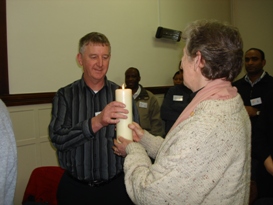Dr Pat Bracken: After words of welcome and a short opening liturgy the meeting was addressed by Dr Pat Bracken. Dr Bracken has provided us with the text of his address which is attached as a separate document. Click here
Morning Group Work sessions
After Dr Bracken’s input participants were divided into groups. Below are the main points that emerged from the morning group discussions. Similar points made by different groups have been merged and grouped together.
• A major sense of frustration with the plight of asylum seekers was evident.
• The difficulties of being an outsider i.e. feeling isolated and unconnected were acknowledged.
• Accurate information is needed to counteract exaggerated and sensationalist media coverage.
• Advocacy was identified as an important tool to address immigrant issues.
• Education was seen as a key to creating awareness and we should be…”prepared to take a risk with difference”.
• We, as a society, must endeavour to recover our Christian heritage, a heritage of social awareness and hospitality.
• We must also acknowledge that we who were once oppressed are in danger of becoming the oppressors.
• Christian action rather than words are needed as are an openness of mind and heart and a willingness to change.
• A need for renewed personal and Church enthusiasm and commitment, a renewed openness and hope.
• There were question marks as to whether the Church in Ireland has done enough to silence prejudice and to uphold the rights of this marginalised group.
• There was a call to politicise locally and nationally to ameliorate the sufferings of the asylum seeker.
• All cultures have a need to integrate – it’s a two way process. Host and immigrant communities must adapt to each other.
• The efforts of small groups of people like us can make a difference and impact positively on the wider community. Small groups have a big role in promoting welcome and inclusion in the church and community.
Sr Pereka Nyrienda A summary of her address is attached as a separate document. Click here.
Afternoon Group sessions: After Sr Pereka’s address participants again divided into discussion groups. The main points that emerged are listed here:
• The Church in Ireland has given Africans “accommodation but not a home”.
• We as Christians should take ownership of the issue of integration. The involvement of laity should be promoted for the future as a means of addressing these issues.
• Integration means both newcomers and the receiving community making an effort to accommodate the other – just like a bridge that allows movement both ways. Integration implies cooperation and a willingness to change.
• We are on the threshold of Interculturalism but we should take ‘baby steps’ to achieve this in a positive way. Change will take time.
• It was also recognised that Irish people need to appreciate their own culture before they can appreciate others.
• An awareness of racism is key to understanding and eradicating it – racism can exist within us all.
• Awareness of ones own racist feelings is a positive step to eliminate such racist sentiments.
• There is a need to be aware of our tendency to perceive culture and especially traditional Irishness, through idealistic lenses
• Dialogue and fresh and innovative thinking is required to meet changing times.
• We should embrace the sharing of experience between cultures now present in our community
• Is the Liturgy truly celebrated and do the laity feel ostracised from participation.
• The concept of ‘welcoming committees’ that could operate in parishes and be a front line in promoting cross cultural care was supported.
• A new Ireland calls for a new Irish church to represent the diversity that exists therein.
• Are we asking the right questions to begin with? Positive change can only occur if we formulate and resolve the questions that matter and which will allow us to redefine and clarify our goals and objectives. We need to identify the relevant questions.
• The moment is ripe now to look inward vis-à-vis immigration. Greater introspection and reflection on the issue is needed.
Closing ritual:
A simple but meaningful ceremony brought the day to a close. Each participant passed a lighted candle on to another. There was a great sense of warmth and unity in the room which culminated in a group holding of hands in a spirit of solidarity and friendship. The day could be summed up as “It wasn’t the end of the start but rather the start of a beginning”.
Other Resources on multicultural worship and integation in the Church.
-
Inter-Church Committee on Social Issues (ICCSI) Website
-
This is a link to a short article from the United Reformed Church that gives an honest and realistic view of the necessity and challenge that inclusion and diversity bring to the Church. Click here
-
Models for Multicultural Liturgy Rev. Mark R. Francis, CSV, S.L.L. Click here
-
Booklet prepared by Fr Alan Hilliard for the Festival of Peoples in 2007. This resource contains sections on;
-
-
Church teaching/statements on Migration.
-
Tips for planning a multicultural celebration.
-
Remote preparation for the celebration.
-
Liturgy Notes.
-
A section on Challenging Myths about Migrant Workers. Click Here
-
-
